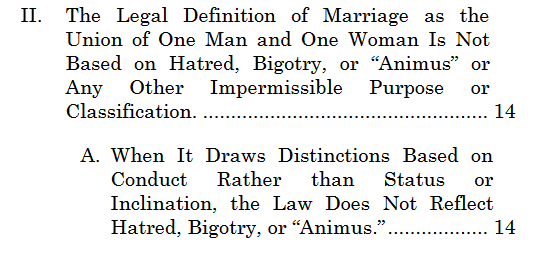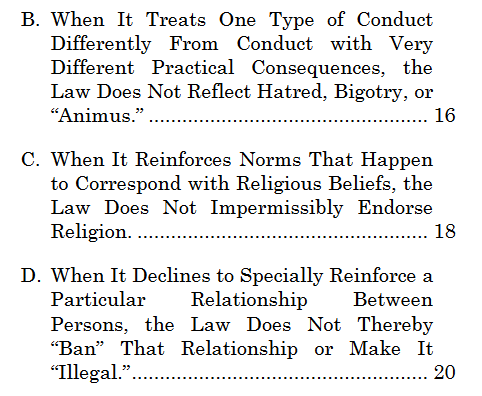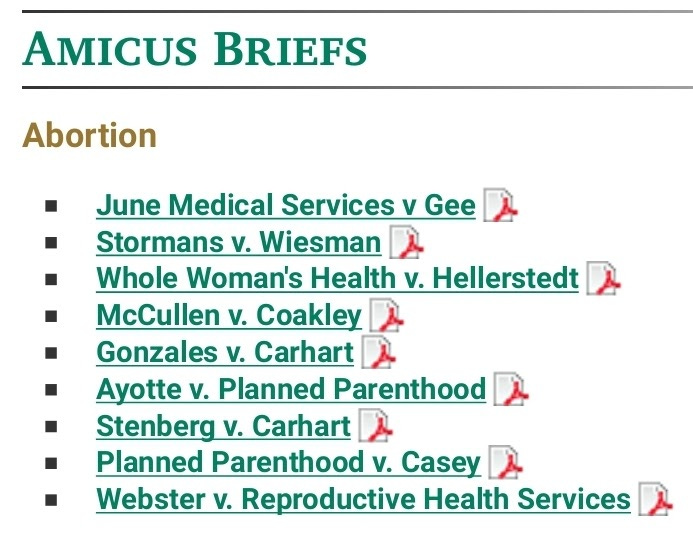New Frontiers in Pointlessness: USCCB Amicus Briefs to the Supreme Court
Do the bishops influence the Court's decisions? (they do not)

[When quoting amicus briefs, I have removed most in-body citations to existing case law for the sake of simplicity. If you are reading the email version of this piece, it may be truncated for length and you can link to the full piece on Substack by clicking on the title.]
I don’t go to a lot of political rallies where priests are keynote speakers, but I found myself at one in February 2018. Unions and their supporters were gathering in downtown Chicago for a “Working People’s Day of Action” to rally against the expected Supreme Court decision in Janus v. AFSCME, a case which would decide whether public sector unions still had the right to collect fees from non-members, a right established by decades-old Supreme Court precedent, that Sam Alito would eventually wipe out because he sucks. Since the case had originated in Illinois, and since Chicago is home to many great and active unions, we took over the streets for part of the afternoon to sing Solidarity Forever and tell Bruce Rauner to fuck off.
The priest who spoke talked about the Catholic church’s support for unions (which, on paper, is great, and in practice has been very hit-or-miss), and said something that caught my interest: the United States Conference of Catholic Bishops had actually filed an amicus brief for this case at the court, advocating for AFSCME in this case. I really was impressed that the church had stepped up to say something about the case, and actually had some sort of faint glimmer of hope that the all-Catholic cadre of conservative anti-union justices on the Court might actually read it.
Well, they didn’t, or if they did, it didn’t matter. But I ended up finding out something else more interesting: there are all sorts of amicus briefs that the USCCB has filed with the court. It turns out the bishops have more on their plates than just sucking Donald Trump’s dick during a campaign call. While they are rarely parties in cases before the Supreme Court, the Catholic church does have a theological and legal interest in many of these cases, so they file briefs as literal “friends of the court” for the justices to peruse and usually ignore on their way to just writing up the thing they had already decided. Since they’re public documents, they’re available for your bedtime reading whenever you like, and the USCCB general counsel - possibly the single most horrible legal job in the country - helpfully groups them by issue on his website.
If you've read any of the previous entries in this series on Catholicism and the Supreme Court, you know that I don't have a very high opinion of the Court or the USCCB, and these briefs strike me as more performative than anything else - the bishops file them because they feel like they have to, and I certainly don't think anyone on the Roberts or Rehnquist Courts has changed his or her mind as a result of reading one of these briefs. If anyone in the conservative majority was going to change their ruling as a result of an amicus brief, the Federalist Society would have never considered them for a seat on the bench in the first place. Influencing the Court will take decades of work to develop a pipeline of judges and tradition of jurisprudence that isn't just using "natural law" to make shit up; it's going to take a lot more than filing a brief.
Still, these are fascinating snapshots of how the Catholic church has interacted with recent history, so as a bonus addendum to this series, I’d like to take a spin through the USCCB briefs on some of the more high-profile Supreme Court cases.
JANUS V. AMERICAN FEDERATION OF STATE, COUNTY, AND MUNICIPAL EMPLOYEES COUNCIL 31 (2018)
At issue in Janus was whether unions could compel non-members who are still represented by the union (for purposes of bargaining, benefits administration, grievance procedure, etc.) to pay “fair share” fees for these services. Practically speaking, gutting the right of a union to collect these fees - going “right-to-work” - has caused unions to dry up from lack of funding and significantly weaken the bargaining and political power of millions of workers. An Illinois employee named Mark Janus, shepherded by anti-union governor Bruce Rauner - the literal dumbest man alive in a state that is also home to Mancow Muller - put together a specious free-speech argument to attack his own union, AFSCME. The bishops took the side of the unions:
“Bishops in the United States have generally been very inimical to “right-to-work” laws, which make union security clauses illegal. Without these clauses, unions face a “free rider” problem that dramatically weakened them and, in turn, their bargaining power on behalf of workers, as experience in “right-to-work” states to date has borne out.”
They’re right, and they know their recent history. The “generally” in the first sentence might be referring to the now-deceased bishop of Madison, who took Scott Walker’s side in the Act 10 fight a decade ago. What’s more interesting, though, are the stakes that the bishops assign to this case:
“The Court should decline this invitation [from Janus]. It should leave constitutional space for the public policy position supported for so long by so many bishops and bishop-led institutions, rather than declare still another such position outside the bounds of what policymakers are permitted to implement by law. See, e.g., Obergefell v. Hodges, 135 S. Ct. 2584 (2015) (definition of marriage); Roe v. Wade, 410 U.S. 113 (1973) (prohibition of abortion).”
Yeah, the bishops literally wrote that gutting unions was on a par with the court protecting the right to terminate a pregnancy or gay people to get married. While I prefer not to think about why they picked those two cases as examples of catastrophic Court decisions, I have to admit that I am impressed by the bishops for taking this so seriously.
THE RESULT - Sam Alito wiped his ass with this brief and finally achieved his decades-long dream of turning all of public sector employment into a right-to-work shop. Management at Catholic organizations like universities and hospitals still seem surprisingly reluctant to their own employees unionizing, which kind of makes me wonder if they gave their attorneys this one as, like, busy work or something.
OBERGEFELL V. HODGES (2015)
Guys, guys. GUYS. When the church says they oppose gay marriage, they want to make it really clear - guys - really clear that it’s not coming from a place of hatred. Just look at this table of contents:


So, just to repeat, this is not hatred, bigotry, or animus. That’s why the brief takes some time to explain that both children and the overall fabric of society will suffer if anyone so much as looks at a gay couple:
“Put another way, it is reasonable for the government to view the union of one man and one woman united in marriage as the preferred environment for the bearing and upbringing of children...It bears emphasizing that a government preference for husband-wife unions as the optimal environment in which to raise children is a judgment about marriage as the only institution that serves to connect children with their father and mother together in a stable home. It is not a judgment about the dignity or worth of any person, married or not. It also is not a judgment about the parental competency of any one person over another.”
Again, this is not about judging a gay person, it is simply a matter of affirming that there is only one right way to do things and gay people are biologically incapable of it, and the church doesn’t think that the government should even consider the possibility that gay people could possibly be in happy or loving marriages capable of raising children. And this can’t possibly count as discrimination, folks - need I remind you of what discrimination actually is?
“When the government treats persons differently because of their race, sex, or national origin, it discriminates on the basis of an immutable trait identifiablefrom conception or birth. In contrast, a decision to participate in a same-sex relationshipis not a trait, but a species of conduct.”
Again, gay relationships are a choice - and the brief is very careful to distinguish that being gay is not a choice, just being in any sort of relationship is. The solution is simple - don’t recognize gay marriage, and ask anyone who isn’t 100% straight to completely gouge any sexuality or romantic love out of their human experience, a solution almost too poetic in its simplicity.
THE RESULT - Anthony Kennedy delivered one of his rare good decisions, before the Federalist Society [allegedly and in parody] blackmailed him into early retirement so they could get a more reliable conservative on the court. Gay marriage is legal everywhere. The Catholic church does not perform sacramental gay weddings, because that was never at issue in this case. When the Catholic church finds that they have inadvertently employed a gay person, they usually move very quickly to terminate that person’s employment through some sort of bullshit “morality clause” language built into their employment contracts, a right that has never been meaningfully challenged in the Supreme Court.
TRUMP V. HAWAII (2018)
This could be remembered as the worst Supreme Court decision of my lifetime. Donald Trump's second, ostensibly less racist, attempt at a "Muslim Ban" on immigration is challenged in the court. Despite the obvious racial animus motivating the ban, the majority decides that the president's broad range of national security powers allows him to be as racist as he would like when it comes to executive orders on immigration.
The brief says all of the things it's supposed to: obviously this is racist, obviously it's a violation of the First Amendment, obviously it's un-American at its core. It also - correctly - states that Catholics have a special responsibility to fight discrimination against immigrants to America, as we once were on the receiving end of that discrimination. The bishops also include some good personal stories about the refugees from these countries that Catholic organizations have assisted with resettlement.
Ultimately, though, the question wasn't whether the Muslim Ban was constitutional, but how deferential the Roberts Court would be to the Trump administration, even if they did something wildly out of line. This was the first real time the question got asked, and it got answered exactly how everyone expected.
THE RESULT - The Court ruled 5-4 that they love their big strong president so much, sir, and can they please also jerk him off. New York Archbishop Timothy Dolan has formally adopted this ruling as his personal theology.
ROPER V. SIMMONS (2004)
Prior to this case, devout Catholic Antonin Scalia had authored a Court opinion allowing for capital sentencing of minors if they were at least 16 when they committed the crime. The Court revisited this precedent, and the USCCB was one of many religious groups in the amicus brief advocating to bar the death penalty for minors, as a form of "cruel and unusual punishment". Each religious group gave an individual statement in the brief, with one eye-catching sentence from the Catholics at the very end of this block quote:
"The execution of juvenile offenders is particularly objectionable when viewed through the lens of the Church’s moral tradition. “[S]ociety must never respond to children who have committed crimes as though they are somehow equal to adults – fully formed in conscience and fully aware of their actions.” This is true in assessing culpability and deciding on punishment, for young offenders generally do not possess the knowledge, experience, reflectiveness, self-control, and judgment that are characteristic of an adult personality. Children are not miniature adults."
While "children are not miniature adults" is, I suppose, biologically accurate, it sounds really dumb when you read it out loud, and it reminds me too much of my toddler daughter calling any child between the ages of 2 and 18 a "tall baby".
THE RESULT - The court ruled 5-4 that capital punishment for minors is an unconstitutional violation of the Eighth Amendment, based on "evolving standards of decency", and 72 death sentences are commuted. Scalia attempted to make some comfort food and cope with his earlier decision being overturned, but accidentally drowned his neighborhood in spaghetti because he forgot to blow three kisses to Strega Nona's magic pasta pot.
PLANNED PARENTHOOD V. CASEY (1991)

Yeah, turns out the bishops file these in abortion cases, too, who'd've thought. And this was a big one - this was the one that conservatives thought was going to overturn Roe v. Wade, with a more conservative set of justices at the helm than we had in the seventies. As the brief puts it, "of the values that the conference seeks to promote through its participation in litigation, respect for life is of the highest importance."
With that in mind, the official points made by the amicus brief are first "can you please overturn Roe", second, "can you PLEEEEASE overturn Roe", and finally "hey Roe was bad, right? Can we overturn that?"

THE RESULT - The Court shocked everyone with a 6-3 ruling upholding Roe, albeit narrowing it. Kennedy was decried as whatever a race traitor is for Catholics. Catholics continued to use abortion case law as an excuse to vote for increasingly nihilistic Republican political candidates. First Things magazine began a meltdown that, as of today, has been continuing uninterrupted for twenty-eight years.
WHOLE WOMAN’S HEALTH V. HELLERSTEDT (2016)
One of the more recent abortion decisions by the court, WWH v. Hellerstedt addressed two Texas state TRAP (Targeted Restrictions on Abortion Providers) laws, which required ambulatory surgical center and admitting privilege requirements for abortion clinics in the state. While these laws are ostensibly passed in the name of protecting women's health, they de facto result in widespread closure of clinics and severely restricted access to abortion in the state. The Court had to decide whether these restrictions met the "undue burden" standard established by Casey and were thus unconstitutional.
The USCCB, of course, was on the side of the restrictions and their brief didn’t contain anything unexpected, but the case is noteworthy because the attorney for Hellerstedt ended up tripping over his own dick during oral arguments. He said that the restrictions wouldn't cause an undue burden, because even if clinics closed in Texas, women could just go to another state to get an abortion. Ginsburg pointed out that this suggested that the Texas laws actually had nothing to do with women's safety and everything to do with stopping women from getting abortions in Texas. Whoops!
THE RESULT - The Court ruled 5-3 in favor of WWH, striking down Texas' TRAP laws (and similar ones in other states). Only eights votes were cast because Antonin Scalia had died, having been swallowed by Monstro the Whale while looking for his son, a wooden puppet magically brought to life by a blue fairy.
